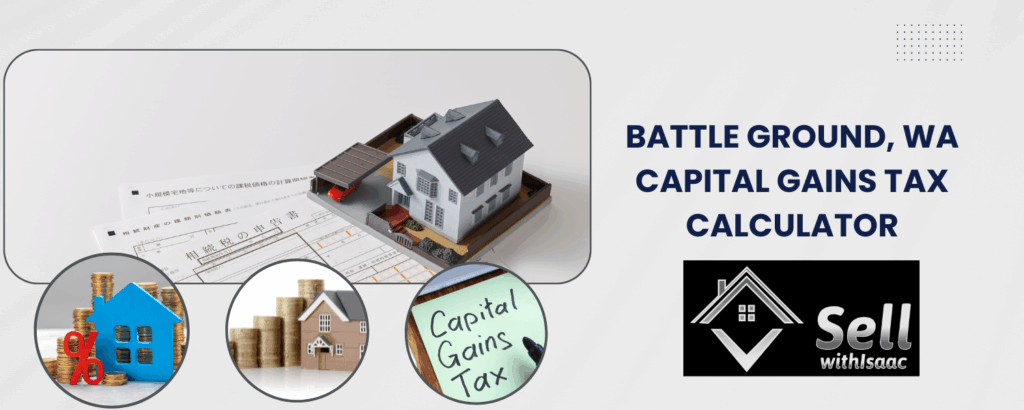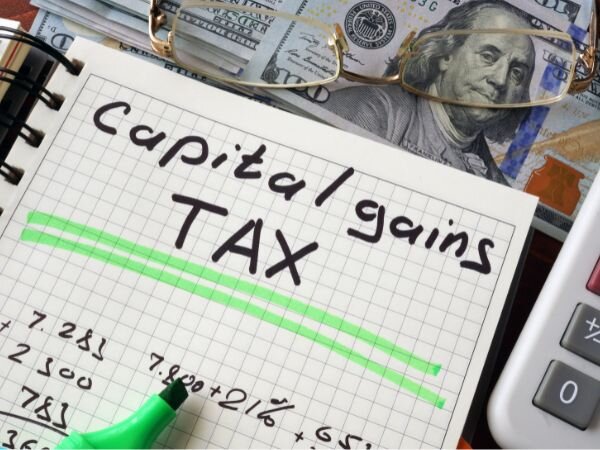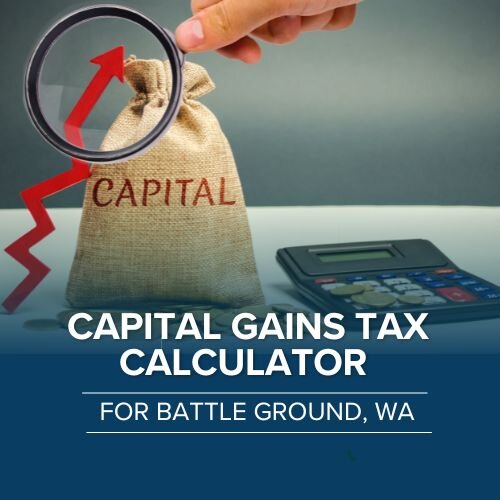
If you wish to sell property, stocks, or other investments, you must understand the financial impact. If you live in Battle Ground, WA, understanding short- and long-term capital gains can boost your income. Our all-in-one capital gains tax calculator simplifies this by estimating your tax liability. This tool helps you comprehend the tax rules and make sensible decisions. This will prepare you for the future. See how it can help Battle Ground, WA, residents manage their money and secure their financial future.
Brief Overview
Capital gains taxes apply to Battle Ground, Washington, residents who acquire stocks or real estate. Short-term and long-term capital gains have very different tax rates. Long-term profit rates are lower. You may estimate your tax obligations with a complete tax calculator. By planning and following guidance, investors can reduce these risks, make good financial decisions, and increase their net income. Local tax specialists help you follow changing state tax legislation and get the maximum tax refund.
Key Highlights
- Planning for the future in Battle Ground, WA, requires considering how selling belongings would affect their budget.
- Investments are attractive because short-term earnings are treated like ordinary income, while long-term gains are taxed less.
- Washington’s capital gains tax affects people’s money and the economy, notably real estate.
- Tax-loss harvesting and leveraging deductions reduce capital gains taxes.
- To make prudent investments, a tax calculator helps calculate your gain tax liability.
Understanding Capital Gains in Battle Ground, WA
Capital gains worry many Battle Ground, WA, residents, especially real estate professionals and investors. You must understand capital gains to arrange your finances when Washington’s tax laws change. Sale proceeds are subject to capital gains tax. This impacts your finances and local economy. This section explains financial gains and how they affect Battle Ground.
What Are Capital Gains?

A capital gain is the money you make by selling property that has appreciated. Gains occur when you sell stocks, real estate, or other valuables and they appreciate. Knowing these profits in Washington State is vital since some assets can trigger capital gains tax. Capital gains should be grouped by asset ownership time before selling. Capital gains are short-term and long-term. Short-term profits are taxed like normal income if you hold assets for less than a year. Long-term capital gains are taxed less, so investors want to invest. The Battle Ground, WA, real estate market is strong, making this a hot issue. When local properties appreciate, they may sell for a lot, affecting the seller’s profit. Knowing the difference between the two gains helps people plan for tax ramifications. It’s crucial to understand Washington’s capital gains tax laws to calculate residents’ taxes. Washington doesn’t tax personal income like other states, but capital gains restrictions might affect your income. If you wish to organize your finances, you must understand capital gains. Understanding tax rates and deductions may help consumers manage gains taxes. Reinvesting or selling assets during tax-friendly times are two approaches to delay capital gains taxes. People with valuables or large investments should know local laws and taxes. This guide helps you stay legal and maximize your money while paying the least amount of taxes. State restrictions might affect your capital gains tax deductions and future tax responsibilities, so stay current. This will help you arrange your finances well.
Impacts of Capital Gains on the Local Economy
Battle Ground’s economy is affected by inexplicable capital gains. After seeing their investments expand and sales revenue rise, consumers spend more, which boosts the economy. The agricultural and real estate sectors benefit most. When the economy is good, people buy expensive stuff. This can boost government and local company revenue. Capital gains can complicate matters, even if they boost the economy. Washington’s capital gains tax affects multiple investments. It affects the economy overall. Profit taxes reduce spending and investing. This may reduce spending and investment. People may invest more in tax-free long-term assets. This would alter local market money flows. Battle Ground’s economy functions like this with real estate. Construction, home improvement, and new homeowner eateries profit when property values rise and people buy and sell houses.
If gains taxes are excessively high, people won’t invest in these things, slowing the economy. Proposed and enacted gains taxes have tremendous mental impacts. Investor confidence is often more affected by market sentiment than policy changes. People react differently to capital gains tax changes. They buy and manage money more carefully. If investors predict capital gains taxes may rise, they can invest in tax-advantaged accounts or countries with better tax legislation. Washington State officials should balance tax revenue with long-term economic growth incentives to avoid negative repercussions. Clearer and more solid rules help people prepare for their money in the future. People can learn more about capital gains tax and other challenging money issues by participating in money education programs. This will boost their and others’ earnings.
Short-Term vs. Long-Term Capital Gains
Battle Ground, WA, residents and investors should understand short-term and long-term capital gains. These two types of capital gains are defined differently and affect your finances, specifically your tax rate and total tax liability. Long-term gains are taxed at lower rates than short-term gains; therefore, people invest longer. Knowing these distinctions may help people choose taxes and investments. This will assist consumers in following their financial goals and Washington tax laws when managing their money.
Defining Short-Term Capital Gains
Short-term capital gains result from selling anything under a year old. This is crucial for fast-money makers. Your gains are taxed at the same rate as your wages. Washington doesn’t have a state income tax, so federal taxes increase as income rises. This is something new investors don’t expect regarding short-term gains and might cause tax issues if not planned for. Good financial planning requires understanding short-term capital gains. Most investors—especially stock traders—make these gains by quickly buying and selling assets or trading them for profit. Due to the high short-term capital gains tax rate, you should carefully consider selling. If you wait more than a year to sell anything, the profit can be taxed at a lower rate as long-term. Understanding short-term financial gains can also reduce taxes. Tax-loss harvesting helps track taxable income. It involves selling losing investments to achieve gains. These people must keep proper records and know IRS guidelines to follow them and keep as much money as feasible after taxes. Investors should consider how short-term investments may affect their taxes this year. This could affect tax filing and financial health. Understanding short-term capital gains helps Battle Ground, WA, residents make better asset decisions and maximize profits. They can also improve things by understanding how federal taxes affect their money.
The Benefits of Long-Term Capital Gains
There are many tax advantages to long-term capital gains over short-term ones. You get these benefits when you sell anything over a year old. The federal government offers tax advantages for long-term investment over short-term speculation. Depending on investor income, long-term capital gains are taxed at 0% to 20%. Short-term gain rates show a considerable difference. Many Battle Ground, WA, residents should invest long-term. Because long-term capital gains are taxed less, investors may hold onto their assets rather than trade them often. This strategy lets you save money on taxes every year, which protects your funds and helps you get rich. Stocks, bonds, and real estate can generate long-term income. These are all benefits of a diverse investment portfolio. Planning taxes around long-term capital gains is also smart.
Keeping investments for a long time might help people manage their taxable income and taxes. Strategic asset management can maximize your tax return and filing by scheduling taxable events at tax-friendly times. Investors can profit from compound growth by hanging onto assets longer. This could yield a much higher return than selling it too soon. The long-term capital gains tax rate may also benefit real estate investors, notably in Battle Ground, WA, where property values rise. Your financial strategy should include keeping properties for more than a year to minimize taxes and take advantage of property appreciation, which boosts investment returns. In conclusion, long-term capital gains can help Battle Ground, WA, investors reach their financial goals. Federal tax benefits help them maximize their post-tax income. Planning protects a person’s money in the future. This stabilizes personal and communal finances.
Calculating Capital Gains Tax
To handle capital gains tax in Battle Ground, Washington, you must understand many financial obligations. People must know their gains tax to make good financial decisions. They are affected by short-term and long-term capital gains. Tax calculators help prepare for filing. This ensures proper tax payment. This section will explain how to calculate your capital gains tax liability and use Washington’s capital gains and tax rates to maximize your tax refund
How to Estimate Your Gain Tax Obligations

Battle Ground, WA, residents must precisely calculate their gain tax obligations for financial planning. Start by understanding Washington’s capital gains tax laws for short-term and long-term investments. A tax calculator will calculate your owed amount based on the gain tax, gains tax, and investment gains rates. By inputting the selling price, asset type, and duration of ownership into these calculators, you can get an accurate tax estimate. Before calculating gain taxes, you must distinguish between short-term and long-term capital gains. As mentioned, short-term returns are from assets held less than a year. Their tax rates are the same as those for regular income. But long-term capital gains come from goods you possess for more than a year. These profits are taxed at 0% to 20%, depending on income. The length of time you’ve owned your assets affects your gain tax obligations and tax rate. Assess current gain rates to determine if your assets are short-term or long-term capital gains. When downloading tax papers in Washington, mistakes might slow down your returns or lead to legal issues. You must understand these gain rates since they affect your gain tax calculation and asset sales and reinvestment decisions. A good tax calculator can tell you what taxes you owe, when you must submit, and provide an estimate based on your situation.
When calculating gain tax, consider the big picture. Since mistakes could result in overpayment or unexpected tax liabilities, you must understand how these duties affect your tax filing. Residents should consider how to file their taxes according to current tax rules. This will maximize refunds and minimize taxes. Financial advisors can reduce capital gains taxes with deductions and deferrals. This ensures that your tax calculations show your entire income. In summary, there are multiple ways to calculate gain taxes. Tax tools and knowledge of Washington’s capital gains tax can help Battle Ground residents calculate their tax liability faster. This proactive method lets consumers adjust their financial plans to take advantage of lower tax rates. This will boost their wallets and the economy. Residents can manage their money and file their taxes on time by planning and reviewing state-specific gains taxes. Remember these Battle Ground, Washington capital gains tax rules: – Determine which assets are subject to capital gain taxation. Discover how long you must keep something to call it a short- or long-term gain. – Check for asset deductions or exclusions. – Understand how state tax laws affect your debt. Discover how federal tax promises affect state debt. – Plan your tax payments to avoid a penalty. New tax legislation may affect how you file or how much you pay. Remembering these facts can help people budget and prepare taxes effectively.
Strategies to Minimize Gains Taxes
Battle Ground, WA, residents should minimize capital gains taxes especially since state tax requirements may be confusing. Smart money management can save taxes and improve finances. You should employ tax advantages, understand gain rates, and file your taxes quickly and easily to handle short- and long-term capital gains. Following these crucial tips when planning future commitments can help people make sensible choices that align with their financial goals and local tax rules. Another option for avoiding long delays and agent commissions is to sell directly to a cash home buyer, which helps you save time and possibly minimize holding costs that increase your overall gain
Effective Ways to Lower Your Tax Liability

There are many ways to reduce your gains taxes. You must know your gains rates and build up your investment portfolio to take advantage of tax benefits to complete a plan. Short-term and long-term capital gains have varying tax rates, so this technique must distinguish between them. Ordinary income and short-term earnings are taxed equally, but long-term gains are taxed less. This means long-term profits are usually better for your money. Using tax deductions appropriately can minimize your tax burden. By mentioning deductions, residents can significantly reduce their taxable income. This reduces capital gains tax. Tax reductions for investment costs are often overlooked but can be helpful. Another option is to limit capital gains with tax losses. This strategy offsets losses on assets with gains, lowering your taxable income and tax burden.
Future gain rates are also essential. Keep current with tax law changes to make smart asset purchases or sales. You may wish to sell assets before interest rates drop to take advantage of lower rates. You can attain your financial goals and stay legal if you plan your tax payments. This method may be preferable using a tax calculator. By entering different financial scenarios, these tools can estimate your future tax bill and help you save money. A tax calculator can show you how filing your taxes differently affects your debt. The detailed information helps you prepare and create a financial strategy that works for you. Knowing your asset class’s rates of return will help you reduce gains taxes. You may pay various taxes on different assets, which may affect your tax filing. These subtleties require knowledge of state and federal tax legislation. To file your taxes correctly and pay less, see a tax specialist or financial adviser who knows Washington’s tax rules. Tax calculators, planning, and deductions help Battle Ground homeowners reduce capital gains taxes. These combined strategies help people respect tax regulations and enhance their finances by paying as little tax as feasible, depending on current and future tax legislation. You must understand and act to handle gains taxes and boost the local economy.
Common Questions About Capital Gains
Battle Ground, WA, residents may struggle to understand capital gains taxes. Understand the regulations and specifics of these transactions’ taxes. This section addresses typical questions and provides expert guidance on how to handle capital gains tax issues, especially for residents considering short-term and long-term investments.
Frequently Asked Questions and Expert Answers
People want to know how the capital gains tax works in different situations. People wonder what a capital gain is and why it’s taxed. Capital gains occur when you sell something for more than you paid. Battle Ground, WA, residents must know about these achievements since real estate and investment opportunities are crucial. The tax on these gains depends on whether the asset is short-term or long-term. Each holding type has different taxes and charges. People often wonder about federal vs. state capital gains taxes. Washington has no state income tax; thus, residents pay federal taxes. However, Washington state capital gains restrictions on some asset sales may affect your money management. People often want to know how much tax they’ll pay on their earnings. Battle Ground residents may benefit from a tax calculator. Local tax laws are considered in these calculators, so users can estimate their costs. How to reduce taxes is another popular topic. Losses from other assets might cut earnings and lower taxes.
This is tax-loss harvesting. Experts recommend knowing gain rates, using deductions, and planning asset sales to maximize tax conditions. Anything held for over a year may be in the long-term group with lower taxes. There is also a lot of misinformation about what forms to fill out, especially for federal capital gains reporting. Residents should keep precise records of the sale, including how much they spent and any unexpected expenses. These facts ensure the numbers are accurate and supported, avoiding IRS issues. What happens when you put money back into tax-advantaged accounts to defer or minimize taxes is commonly asked. Battle Ground buyers and sellers could make a lot of money by consulting a financial expert. When you get professional help with tough situations, you can be confident your financial strategies meet your goals and local tax rules. Reading FAQs and seeking professional advice may help you comprehend capital gains tax and receive the greatest financial results.
Planning for Capital Gains Taxes in the Future
In Battle Ground, WA, where the economy is continuously changing, capital gains taxes must be planned ahead. If you prepare, you may pay less in taxes and maximize your assets. This overview covers managing long-term gains and ensuring appropriate tax estimates and deductions. We’ll also discuss how to quickly and efficiently file your taxes and create financial strategies that account for potential debt. When you sell a property in Battle Ground, WA, any profit made from the sale could be subject to capital gains tax, depending on how long you’ve owned the home
Essential Tips for Long-Term Capital Gains Planning
To plan long-term capital gains, you must understand the big picture and tax rules. You can easily lower your taxes by investing in products that will make you less money over time. Capital gain tax is lower if you hold assets for longer than a year. This can range from 0% to 20% of your earnings. This delay helps you attain your financial goals and establishes a long-term tax reduction approach used in good future planning.
Tax calculators are invaluable for money-savvy people. The calculator displays how tax rates affect different assets and how long you own them. These calculators use investment data to predict tax liability more accurately. This will improve your tax management. This preparedness ensures that tax payments won’t surprise you and disrupt your long-term financial goals. It is essential to tax planning. Using deductions helps plan for long-term financial gains. You can reduce taxed gains significantly by knowing your deductions. Investment expenses are a common deduction. This reduces gains tax and other taxes. Keep proper records of these deductions to ensure you submit your taxes correctly. Your money plans will work better.
When planning investments, future rates of return are vital. You can sell your assets for the best price as tax legislation changes by monitoring potential changes. This proactive strategy ensures you sell investments when taxes are low, lowering your taxes. These strategies can help you organize your money throughout time, which will help you complete future jobs better.
Financial experts can also assist you in planning long-term by providing capital gains tax advice. These experts can help you determine the optimal tax-cutting options for your portfolio. They may advise tax-deferred programs or other methods to reinvest your money to reduce gains taxes. A professional can help you make sensible investments that keep up with changing tax regulations, and you obtain the most deductions to lower your taxes and secure your future.
To conclude, using a tax calculator correctly, using deductions and credits, and timing your activities to match predicted gain rates is the best method to plan for capital gains. This advice will help you improve your money, avoid tax surprises, and prepare for a bright financial future in Battle Ground, WA, where the economy is always changing. Understanding and applying these methods will help you succeed long-term.
Finally, Battle Ground, WA, residents who want to maximize profits must understand capital gains taxes. A decent capital gains tax calculator can estimate your tax liability and post-tax income. This applies to long-term and short-term spending. If you plan and calculate capital gains correctly, you may make smarter financial decisions, pay less tax, and improve your investing strategy. Consult a financial expert to ensure you’re following the latest tax requirements and maximising your money.
What are capital gains, and how do they affect residents in Battle Ground, WA?
When you sell something that has appreciated, you get a capital gain. These Battle Ground, WA gains are important for calculating tax liability, especially in busy stock and real estate markets. Since short-term and long-term earnings affect taxes differently, people may manage their money differently.
How do short-term and long-term capital gains differ in terms of taxation?
Selling assets you’ve owned for less than a year incurs the same taxes as normal income. Long-term capital gains are taxed less than short-term. Properties owned for over a year generate these gains. People prefer to invest long-term because of this. This difference is crucial for Battle Ground, WA, financial planning.If you’re planning to sell your property quickly—especially within a year—a cash buyer in Washington can make the selling process smoother and help you close on your timeline
Why is it essential to use a capital gains tax calculator in Battle Ground, WA?
You can calculate your tax liability by reviewing federal and Washington state tax laws. This tool simplifies tax calculations, helping investors plan ahead and maximize asset returns by taking advantage of lower long-term tax rates.
What strategies can help minimize capital gains taxes?
Harvesting tax losses, employing deductions, and selling assets during tax-friendly seasons can save money. Knowing the tax rates for short-term and long-term gains may help people maximize their money and pay less in taxes.
How do local and federal tax policies impact capital gains in Battle Ground, WA?
State income taxes are rare in Washington, although the federal government can tax capital gains. Residents must follow tax law changes because they may alter deductions and tax liability. Strategic planning helps manage these tasks.
Helpful Battle Ground, WA Blog Articles


